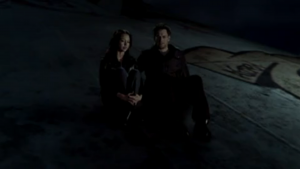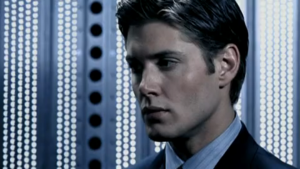A Subjectively Obscure SciFi Primer: Dark Angel
- May 18th, 2015
- Posted in A Subjectively Obscure SciFi Primer
- Write comment
 This month, the Obscure Sci-Fi Primer hops back over to cyberpunk with the Fox series Dark Angel. Unusually for a sci-fi series on Fox, it actually managed to get a second season before being screwed over, which makes it the first show in the Primer to have lasted longer than one (although the two seasons are radically different). More typically, it was shunted to the Friday Night Death Slot and quietly killed to make room for Fox’s next victim, Firefly. The show was created by James Cameron, the king of the box office himself, and Charles H. Eglee, and was originally made with the idea of a feminist superhero in mind. Set in a dystopian version of Seattle, of all places, Dark Angel possesses a lot of cyberpunk themes while focusing heavily on genetic engineering and secret government projects. But is it worth watching now, just 4 years away from the time it was set?
This month, the Obscure Sci-Fi Primer hops back over to cyberpunk with the Fox series Dark Angel. Unusually for a sci-fi series on Fox, it actually managed to get a second season before being screwed over, which makes it the first show in the Primer to have lasted longer than one (although the two seasons are radically different). More typically, it was shunted to the Friday Night Death Slot and quietly killed to make room for Fox’s next victim, Firefly. The show was created by James Cameron, the king of the box office himself, and Charles H. Eglee, and was originally made with the idea of a feminist superhero in mind. Set in a dystopian version of Seattle, of all places, Dark Angel possesses a lot of cyberpunk themes while focusing heavily on genetic engineering and secret government projects. But is it worth watching now, just 4 years away from the time it was set?
Dark Angel follows Max, a genetically engineered “X-5”, part of a program of super soldier creation, run by an organization called Manticore, from the early 2000s. Max and a whole class of other X-5s managed to escape back in 2009. They split up for safety, and ever since she’s been looking for what happened to her brothers and sisters while playing the vigilante for her heroic hacker friend Logan Cale, better known to the world of Dark Angel as “Eyes Only.” Her day job is working for a bizarrely anachronistic delivery company, which doesn’t even pay enough to allow her to properly rent an apartment (although it does, apparently, pay for huge quantities of motorcycle gas). It’s one of those superhero jobs that gives her an excuse to travel between the different sectors of the otherwise strictly divided city. The many anachronistic aspects of the show can be chalked up to an EMP blast set in the show’s backstory, which led to an economic crash and set tech in general back to… about the level it was at time the show was filmed. Convenient. They got the economic crash pretty close to the real one, though.
For a show that was short-lived, it managed to launch quite a few careers. Max is played by Jessica Alba, who went on to big-time stardom for a little while after this show ended. Logan is played by Michael Weatherly, who’s far more recognized now as DiNozzo on NCIS. Season 2 brings in another “transgenic,” one of the X-5s like Max, named Alec and played by Jensen Ackles, currently setting fangirl hearts aflutter as Dean on Supernatural (that’s two articles in a row mentioning that show!). Other familiar faces on the show include Nana Visitor (Kira from Deep Space 9) as a villain and Grace Park (Boomer from Battlestar Galactica) in a brief spot as another transgenic.
The Good
- Genetic Engineering is one of those things that doesn’t tend to get much focus on TV, so having a whole show about it is nice. It tends to be almost entirely overlooked in space-based shows, and when it does show up… well, that’s a topic for another time. Suffice it to say, the portrayal of it throughout season 1 is mostly done well.
- As I mentioned earlier, the show was designed with feminist ideas at its core, and in that regard it’s fairly successful. Max is strong and independent, and doesn’t spend too much time worrying about romantic entanglements. Men don’t have to save her, and when they try, it’s usually more out of their personal desires to fulfill masculine stereotypes than her actually requiring their help. The show also has a gay main character and gives a surprisingly positive portrayal of transgendered people, which makes it almost shockingly progressive for a show with a 2000 premiere date.
- Throughout the first season, the story’s myth arc is fairly strong, and that’s what managed to keep my interest. That degrades pretty quickly going into the second season, but the finale manages to pull some of the monster-of-the-week nonsense into a reasonable plot.
- With a few exceptions, the grungy cyberpunk aesthetic is maintained very strongly, while not going too far in copying Blade Runner the way some other shows we’ve looked at have. This helps it feel like a consistent world of its own, instead of a knockoff or a poorly decorated version of a modern real city.
- Dark Angel had a few Star Trek alums working on it behind the scenes, including Ira Stephen Behr and Rene Echeverria, who both wrote scripts for the series. Since other aspects of the writing were… lacking, to say the least, having some experienced writers on hand helped to keep it going.
The Bad
- So like I said, the show premiered in late 2000… but it is the 90s-est show I have ever seen. The dialog from most of the secondary characters has the most “totally radical,” written-by-people-who-never-used-slang-in-their-life feel to it. This extends to character names as well–everyone at Max’s workplace has a weird name. Sketchy, Normal, Herbal Thought (who mysteriously disappeared between seasons), Original Cindy… it gets really grating. I assume it was part of the hip-hop/rap culture vibe that permeates the show, but it feels like a lame attempt at trying to give characters overly cool names like in traditional cyberpunk works.
- Characterization throughout the show can be weird sometimes, and this applies to both seasons. Max, for example, hates guns, but has no problem killing with her bare hands. I’m not talking “Batman beat them up and leave them in a situation where they might die” style killing, either. I’m talking snapping necks. And when her friends find out her secret, their “good-natured joshing” seems a lot more vicious than it ought to. I mean, calling her a “genetically engineered killing machine” is a little harsh, don’t you think? Would you want your friends reminding you of that constantly? No, I didn’t think so. Which brings me to…
- Acting problems. For a show that launched so many careers, the acting is often subpar. Part of this is due to the irritating overuse of slang, as noted above; it’s hard to deliver that kind of dialog in a convincing way, so that’s on the writers. Part of it seems like it could come from directing, as they aren’t consistently awful or anything. But trying to claim it’s the directing is impossible to prove; James Cameron steps in for the finale, and there’s a pretty noticeable difference when he does, but not everyone is at the top of their game, even with Cameron. So I gotta put some of it on the actors.
- The whole “cat DNA”/”going into heat” thing is probably the worst plot device ever. ugh. Feline DNA is not relevant or demonstrated at all, more of an informed ability. The “going into heat” aspect especially feels like something some executive forced them to include for extra sex appeal, which is ironic given the “sex symbol” status that Jessica Alba achieved not long after. I guess the tight leather outfits weren’t enough.
- You might have noticed I keep specifying season 1 or season 2. That’s because there was a major retool between seasons; apparently it was doing well enough to get renewed, but not well enough that Fox was happy with it. The story arc is pushed into the background, instead giving the show a “freak of the week” feel to it as a huge number of other transgenics are released in the season 2 premiere. It makes no sense plot-wise for Manticore to have been holding onto all these horribly deformed failed experiments; they use the above “cat DNA” as an excuse to create more monstrous-looking characters, as part of that concession to monster-of-the-week demands. They introduce a ton of new characters in the beginning of the season and take the focus off of the existing ones through obnoxious and convoluted means, like a virus that’s keyed only to Logan. Most of the new characters become irrelevant quickly to boot. The ones that stick around, most controversially Jensen Ackles’ Alec, are ANNOYING as fuck. I hated his character so much I was ready to give up on it entirely. Apparently, there’s a rather large rift in the fandom over this, between people who came to the show later to see more of their Supernatural favorite, and people who watched it when it aired and blame his introduction, and all it stands for, for ruining the show. It’s easy to see why.
All in all, Dark Angel had a fairly interesting premise and a story that was worth following, but as is the case with many Fox shows, executive interference beat it down and killed it. The first season is significantly better than the second, in my opinion, but the second does have an uptick in quality about halfway through. It’s just that the show was already hanging by a thread and couldn’t afford to waste half the season floundering in the wake of Fox’s meddling. Big changes in tone (Can you call it Dark Angel with all the darkness removed?) and a timeslot shift finished it off, and as usual, that means cliffhanger ending.
A quick reminder of my rating system: a 5 represents must-see–a “hidden gem,” as it were. A 4 is good, solid television. A 3 is “cult classic” stage, where the show’s appeal is likely limited to a specific group. A 2 is flawed, but fun, or even “so bad it’s good,” depending on the series and its release timeframe. A 1, of course, is avoid at all costs. Unfortunately, Dark Angel is not currently available on Netflix, Amazon Prime, or Hulu… there’s always DVDs?
Have any suggestions? Or are there any little known shows you’re a fan of that you’d like me to cover? Leave them in the comments, or send a tweet to @RetroPhaseShift. To be notified of the next entry in the Subjectively Obscure Sci-Fi Primer, you can subscribe to the RSS feed by clicking here.







I never did watch this show but that was a fun read. I am looking forward to the genetic engineering comparison across series that you teased.
PS: Here is another show to add to your list. I liked it
http://bit.ly/1JsMGLS